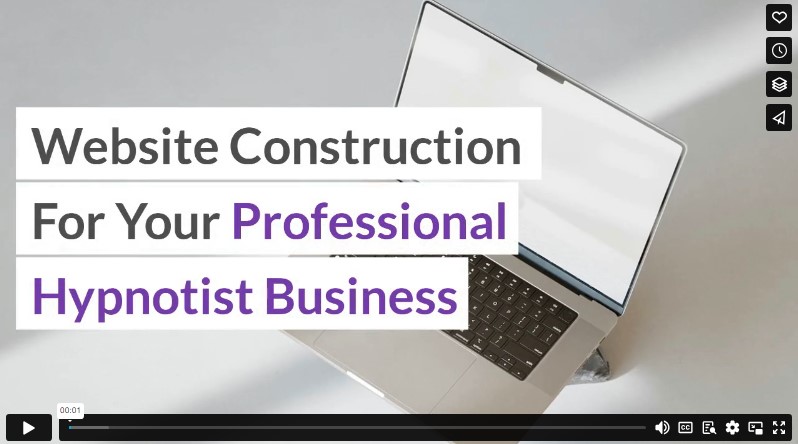Building a successful website is essential if you are wondering how to start a hypnotherapy business. Even if you conduct all your appointments face-to-face, a website presence is critical to give you an edge with the competition.
Advancements in website design software have allowed anyone to build a webpage, no matter their technological skills. Follow these tips to create or update your website today.
What’s The Point?
You need a clear idea of how you will utilize your website. Depending on the type of appointments and clients you have, you might have a different purpose. For example, if you meet in person, your website might be more informative, containing the highlights of your practice, methods of contact, and a calendar for online bookings. If you conduct virtual appointments, your website might be where you complete most of your business.
Regardless of what type of website suits your needs, make sure you explain what your company does in clear terms on your homepage. Making people search for what you actually do will lose many prospective clients at the beginning.
It’s All In The Name
If you think choosing your domain name is the easiest part of this process, consider the example of Facebook. Something as small as removing ‘The’ from Facebook changed the world. Your name is one of the most crucial features of your website.
Avoid abbreviations, numbers, acronyms, or anything overly complicated or difficult to remember. Be careful about accidentally creating a SLURL; the most infamous example is when Pen Island started its website penisland.com. Gasp! Go with something that is (appropriately) descriptive and easy to type and remember.
You also will need to decide on your top-level domain (TLD.) It can be the classic .com, .net, or .co. Or it can be location or business-based like .fl or .hypnotist. Once you think you have your domain name, do a quick internet search to see if anything unsavory pops up or if you are infringing on anyone else’s protected name.
Next, confirm the availability and buy the rights through a registrar such as GoDaddy, Squarespace, Wix, or Domain.com. If your URL isn’t available, you may be able to contact the company that owns it to purchase it from them, or some domain sites will do that for you for a fee.
When selecting your domain registrar, some also offer hosting services. Every site needs a host with a server that stores all your data. Unless this is something you already have, paying for an external host is much less expensive. Remember that free hosts employ other methods of making money, such as placing banners or pop-up ads on your site. Read the fine print of their plans, and select a scalable option for your site as you grow.
Design Your Pages
Think about websites you’ve visited recently. What did you like about them? What was annoying? You want to design your page with the user in mind.
If you think about it from the viewpoint of your potential clients, your website will be much more intuitive and user-friendly. Keep your design simple, with uncluttered pages, and it will be easy to navigate. Make sure the resolution of your images isn’t so high that it causes your pages to load slowly. People don’t want to wait around for that.
Have multiple pages for the different aspects of your business, such as home, about us, contact, booking, and blog pages. They should all support your primary purpose for your site and include a call to action such as “sign up,” “book now,” or “contact us to learn more.”
If you include a book now feature, you will need to have a payment system integrated into your site. Square, Stripe, and Chase are a few credit card processor solutions readily available for your business page.
Publish Your Site
Once you publish your site, don’t be too quick to share it with everyone. Check it on every popular browser: Safari, Chrome, Firefox, Internet Explorer, and Microsoft Edge. Navigate through all pages and click the links. This ensures your features work on each browser and images display as you planned.
Make sure your site works in the mobile format in each browser on both phones and tablets. Testing it on different devices and with different browsers can take time and effort if you don’t have an entire tech fleet, but it’s well worth it.
If you plan to take advantage of analytics, it’s easier to set this up before going live. This guarantees your numbers are as accurate as possible.
Market Yourself
Having an online presence isn’t enough these days. Facebook, Instagram, Twitter, LinkedIn, Pinterest, and even TikTok are all social media platforms that will increase your audience reach. It’s also an easy space to keep your clients updated on what’s going on with your business. You’ll maximize engagement by linking your business website with your social media posts.
To increase your online rankings, look to maximize search engine optimization on your site. You will want to build relevant keywords into your website content from the get-go and submit your website to major search engines to increase your potential leads.
You’ll also want to post fresh content on your site regularly (blogs, infographics, videos, etc.) This content should engage your client base, answer their questions, and help establish you as an authority in your industry. If you aren’t technologically savvy or are focused more on your client base, you may want to consider outsourcing your search engine optimization.
Maintain Your Site
After your site is up and running, it’s important to check that your website is running smoothly about once a month. Each update from a browser can easily change how your site is operating. You will also want to make sure it’s still relevant and accurate. If you have your website updates, blog posts, and social media linked, it’s easy to check functionality and update everything in one move.
Ultimately, you want your business to be easily accessible and portrayed in the best light, and your website should do that. If you don’t want to lose your whole marketing budget paying a professional, building your own is a low-cost investment to increase credibility and professionalism and reach a broader potential client base than you could through other marketing techniques.
Infographic
If you’re wondering how to officially start a hypnotherapy business, creating a great website is crucial. Building your own is a low-cost investment to boost credibility and reach a larger prospective audience. You want your company to be seen and presented in the best possible way, and your website should do that.

Video




